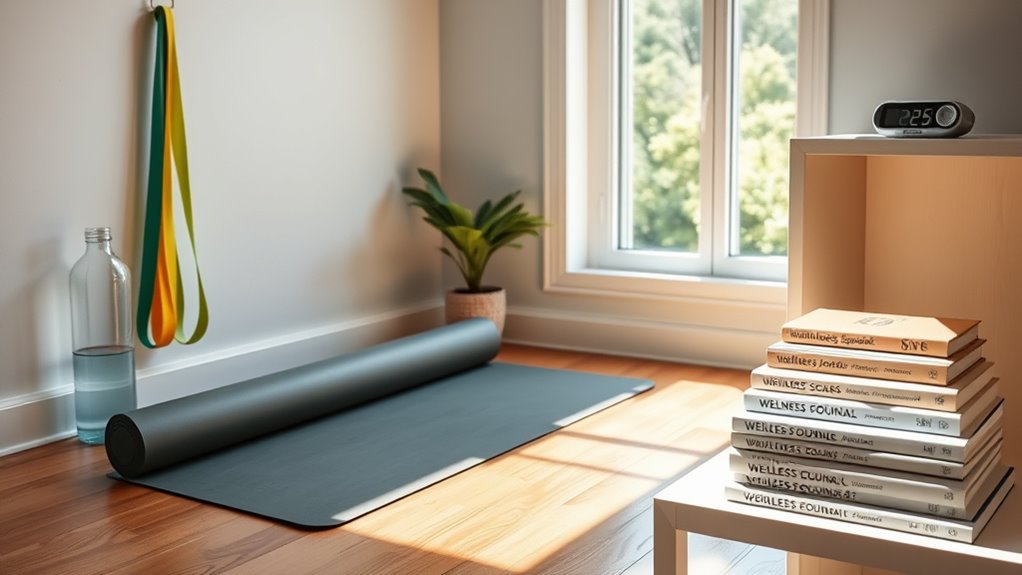To make wellness part of your daily routine, start by integrating mindful eating, focusing on savoring each bite and listening to hunger cues. Establish consistent sleep habits by creating a relaxing environment and limiting screens before bed. Recognize quality foods to avoid spoiled items and boost your energy. Small, intentional changes can transform your habits over time, making wellness a natural part of everyday life — and you’ll discover more ways to build this lasting foundation as you continue forward.
Key Takeaways
- Incorporate mindful eating practices by savoring meals, chewing thoroughly, and listening to hunger cues.
- Establish a consistent sleep routine with calming pre-sleep habits and a sleep-friendly environment.
- Prioritize food freshness and quality to support overall wellness and healthier choices.
- Set small, achievable goals to gradually integrate wellness habits into daily life.
- Use reminders and routines to reinforce consistent practices like hydration, movement, and relaxation.

Creating healthy habits can considerably improve your overall well-being, but developing them requires intention and consistency. One of the most effective ways to start is by focusing on mindful eating. When you practice mindful eating, you pay close attention to what and how you consume food, rather than eating automatically or while distracted. This means slowing down, savoring each bite, and truly listening to your body’s hunger and fullness cues. By doing this, you not only enjoy your meals more but also prevent overeating and make healthier choices naturally. Incorporate small changes like turning off screens during meals, appreciating the flavors, and chewing thoroughly. Over time, these simple shifts help you build a respectful relationship with food, fostering better digestion and greater satisfaction from eating. Mindful eating also encourages you to choose nutrient-rich foods, which supports your energy levels and overall health. Additionally, being aware of your food’s freshness, such as recognizing spoiled lemon juice, can help you avoid consuming spoiled items and maintain better health.
Alongside mindful eating, prioritizing sleep hygiene is *essential* for establishing a healthy routine. Sleep hygiene involves creating an environment and habits that promote restful sleep. You can start by setting a consistent sleep schedule—going to bed and waking up at the same time each day helps regulate your body’s internal clock. Avoid caffeine and heavy meals before bedtime, and limit screen time in the hours leading up to sleep, as blue light from devices can interfere with melatonin production. Instead, develop a calming pre-sleep routine, such as reading, gentle stretching, or practicing relaxation techniques like deep breathing. Make your bedroom a sanctuary for sleep—keep it cool, dark, and quiet, removing distractions that might disrupt your rest. Quality sleep isn’t just about quantity; it’s about the consistency and depth of your sleep cycles. When you improve your sleep hygiene, you’ll notice increased energy, better mood, sharper focus, and a stronger immune system. These benefits reinforce your motivation to stick with your healthy habits, creating a positive feedback loop that enhances your overall wellness.

Bariatric Portion Control Flatware Set for Healthy Eating, Spoon, Fork, and Knife Set, Helps Reduce Food Intake Amounts, 3 Piece Set (Case Included)
Bariatric-friendly utensils tailored for precision portion control, indispensable for your journey towards healthier eating habits. This versatile silverware…
As an affiliate, we earn on qualifying purchases.
As an affiliate, we earn on qualifying purchases.
Frequently Asked Questions
How Long Does It Take to Form a New Habit?
Habit formation varies for everyone, but generally it takes about 21 to 66 days for a new behavior to become automatic through consistent practice. You need to stay patient and persistent during behavior change. Focus on small, manageable steps, and keep practicing daily. Remember, the key is consistency, not speed. Over time, your new habit will become a natural part of your routine without requiring much effort.
Can Unhealthy Habits Be Replaced Overnight?
Unhealthy habits can’t be replaced overnight, as habit formation takes time and consistent effort. You might see quick changes initially, but lasting behavioral change requires patience and persistence. Instead of aiming for immediate transformation, focus on small, manageable steps that gradually replace old routines. Remember, successful behavioral change builds over days and weeks, so be kind to yourself and stay committed to your journey toward healthier habits.
What’s the Best Time of Day to Exercise?
You might think exercise timing is just a minor detail, but it can totally transform your workout. The best time of day to exercise depends on your schedule and energy levels. For most, the ideal workout hours are early mornings or late afternoons when your body is naturally more alert and flexible. Find what works best for you, and you’ll make fitness a natural part of your day—like clockwork!
How Do I Stay Motivated During Setbacks?
When setbacks hit, stay motivated by making mindset shifts. Remind yourself why you started and focus on progress, not perfection. Find accountability partners who encourage you and hold you responsible, making it easier to bounce back. Celebrate small wins, and don’t be too hard on yourself. By adjusting your perspective and leaning on support, you’ll keep moving forward even when motivation dips.
Are There Apps That Help Build Healthy Routines?
Sure, because who doesn’t want a tiny digital nag telling them what to do all day? Luckily, apps like Habitica, Streaks, and Fabulous excel at habit tracking and routine reminders. They turn building healthy routines into a game, making it feel less like a chore and more like an adventure. With these tools, you’ll stay accountable, get motivated, and finally conquer those pesky habits you’ve been meaning to master.

Magicteam White Noise Machine with 20 Non Looping Natural Soothing Sounds Memory Function 32 Levels of Volume Powered by AC or USB and Sleep Sound Timer Therapy for Baby Kids Adults Black
❤20 Non-Looping Sleep Sounds: White noise ,Brown noise, pink noise, blue noise, fan,brook, rain, ocean,bird and Bonfire,suitable for…
As an affiliate, we earn on qualifying purchases.
As an affiliate, we earn on qualifying purchases.
Conclusion
By weaving small, positive habits into your daily routine, you’re planting seeds that will bloom into a vibrant garden of wellness. Each choice you make is a drop of water nurturing growth, turning your life into a flourishing landscape of health and happiness. Remember, consistency is the sunlight that helps these habits thrive. With patience and persistence, you’ll watch your wellness journey blossom into a beautiful, lasting masterpiece.

Produce Storage Guide Magnet – How to Store Food Magnet for The Fridge, Fruit & Vegetable Cheat Sheet, Kitchen Organizer Magnetic Chart, Food Storage Chart, Kitchen Fridge Magnet
Proper Food Storage Guide – This magnetic produce chart helps you know exactly where to store all types…
As an affiliate, we earn on qualifying purchases.
As an affiliate, we earn on qualifying purchases.

Allura & Arcia 52 Stress Less & Self Care Cards – Mindfulness & Meditation Exercises – Anxiety Relief & Relaxation
52 EASY EXERCISES FOR EVERYONE: This unique Self Care Deck contains 52 extremely effective exercises for mindfulness, meditation,…
As an affiliate, we earn on qualifying purchases.
As an affiliate, we earn on qualifying purchases.










